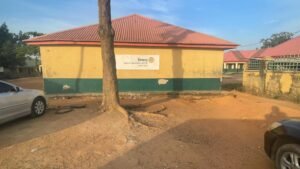
Abuja, Nigeria – In the fast-growing settlement of Lugbe, along Abuja’s Airport Road, schools and healthcare centres once ignored and dilapidated are being brought back to life — one wall, one borehole, and one health awareness sign at a time. Through targeted interventions, the Rotary Club of Nigeria is proving that civic action can fill critical gaps in public services, restore community trust, and advance the Sustainable Development Goals (SDGs), including SDG 3 (Good Health and Well-being), SDG 4 (Quality Education), and SDG 17 (Partnerships for the Goals). Obinna Chukwu, write.
Where Public Services Had Failed, Rotary Took Action
Across Lugbe, broken walls, dry taps, and flickering lights were once the norm. By rehabilitating existing schools and clinics, Rotary is showing that development doesn’t always require starting from scratch — sometimes it’s about fixing what’s been neglected.
At Kuchigoro LEA Primary School, pupils previously studied beside a crumbling wall that posed daily safety risks. Rotary funded the renovation, replastering, and repainting of classrooms, creating a safe and inspiring learning environment.

“Attendance has improved, and parents now trust the facilities,” noted a school official. “The children are more focused and motivated.”
According to UBEC, over 50% of public schools in Nigeria lack basic infrastructure, including desks, toilets, and classrooms. A 2022 NBS survey found that 62% of schools lack potable water, while 78% have non-functional toilets, leaving millions of children in unsafe and unsanitary conditions.
Clean Water Revives Healthcare Delivery
At Karonmagiji Primary Healthcare Centre, staff once relied on paid water vendors to perform daily tasks — sometimes delaying patient care. Rotary installed a borehole with an overhead tank, ensuring uninterrupted access to clean water.

“Before the borehole, we had to suspend deliveries when water ran out,” said Nurse Gloria. “Now we can maintain hygiene and serve more people. Confidence in our clinic has grown.”
This intervention addresses a national crisis: 95% of healthcare centres in Nigeria lack combined water, sanitation, and hygiene (WASH) services, according to research.
Additionally, 60 million Nigerians lack access to basic drinking water, and 80 million have no improved sanitation, according to a 2019 World Bank report.
At Kuchigoro PHC, Rotary also introduced health awareness campaigns through signage promoting family planning and preventive healthcare — a reminder that healthcare extends beyond treatment to education.
Complementary Development: A Smart Strategy
Rotary’s Lugbe projects embody “complementary development”, a strategy where NGOs strengthen government facilities rather than duplicate them.
“When civil society reinforces existing public infrastructure, it amplifies government investment and builds community trust,” said Mr. Kanayo Uche, a development analyst. “Rotary’s model shows how targeted interventions can achieve lasting impact.”
This approach is particularly crucial given Nigeria’s funding constraints. UNESCO reports that Nigeria allocates less than 6% of its national budget to education, far below the recommended 15–20%. The country also has the highest number of out-of-school children globally, with about 10.5 million children not attending school as of 2020.
Measurable Results, Sustainable Impact
Rotary’s work has produced tangible outcomes:
At Kuchigoro school, attendance has risen and student engagement has improved.
At Karonmagiji PHC, patient visits doubled after reliable water supply was restored.
At Kuchigoro PHC, family planning signage attracted new visitors seeking reproductive health guidance.
Research confirms that quality infrastructure improves concentration, learning outcomes, and student performance, while poorly maintained facilities contribute to fatigue, distraction, and absenteeism.
“Rotary’s strategy is a model of partnership-driven efficiency,” said Mr. Uche. “Civil society strengthening existing facilities amplifies public investment and builds trust in governance.”
Rotary’s National Footprint
The Lugbe initiative is part of a broader commitment by Rotary District 9127, which serves 17 Northern states and the FCT, with over 160 active clubs and 3,000 members, targeting $600,000 in humanitarian aid for 2025–2026.
Across Nigeria, Rotary focuses on seven key areas:Disease prevention and treatment, Water, sanitation, and hygiene, Maternal and child health, basic education and literacy, peace-building and conflict prevention, economic and community development, and environmental protection.
Projects range from sinking boreholes and donating school supplies to supporting small businesses and healthcare facilities.
Scaling What Works
Rotary’s Lugbe model demonstrates that sustainable change can be achieved without massive budgets or new construction. By rehabilitating existing facilities and providing functional support, NGOs can create long-term, measurable impact.
Nigeria’s urgent needs are clear: Over 200 million citizens face gaps in basic infrastructure.
Poor water and sanitation contribute to over 70,000 child deaths annually.
Roughly 75% of children aged 7–14 struggle with literacy and basic numeracy.
Rotary’s focused interventions — renovating school walls, installing boreholes, and promoting health awareness — show that partnership, precision, and purpose can bridge service gaps efficiently.
Sustainable Change, One Project at a Time
Today in Lugbe, children learn in safe, renovated classrooms, mothers give birth in clinics with running water, and communities are reminded daily through health awareness signage that their well-being matters.
This is how sustainable change begins: one wall, one borehole, one signpost at a time.




